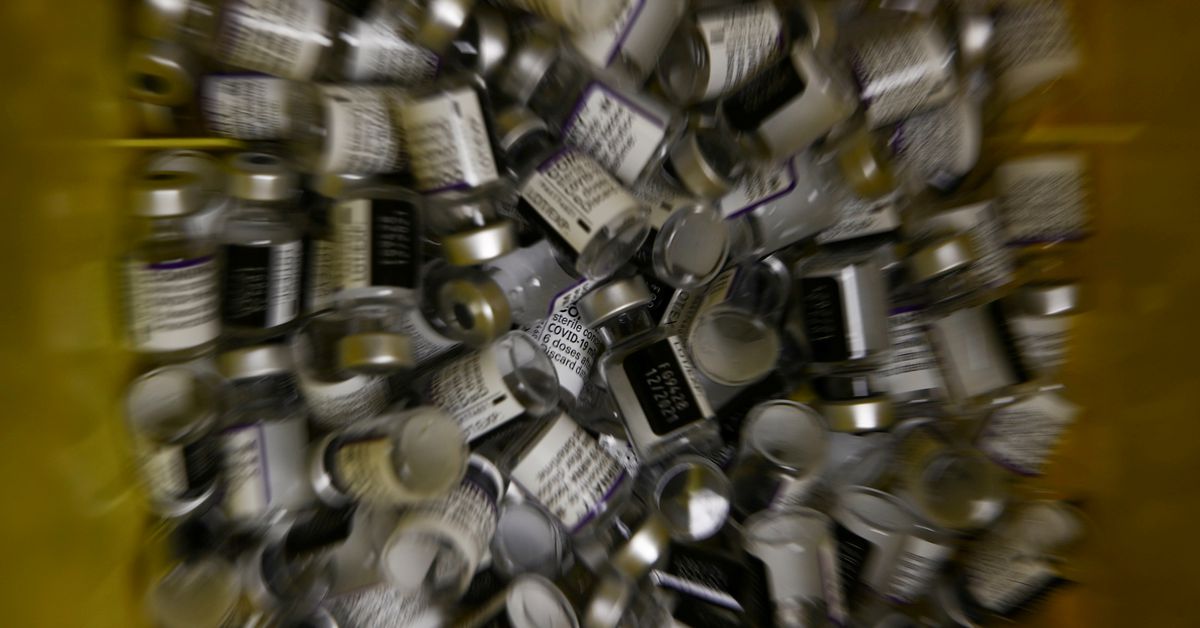Empty vials of the “Comirnaty” Pfizer-BioNTech COVID-19 vaccine are seen inside a waste package at a coronavirus disease (COVID-19) vaccination center in Madrid, Spain, November 24, 2021. REUTERS/Sergio Perez/File Photo
Register now for FREE unlimited access to reuters.com
Register
FRANKFURT, Nov 26 (Reuters) – BioNTech SE (22UAy.DE) said on Friday it expects more data on a worrying new coronavirus variant detected in South Africa within two weeks to help determine whether its vaccine produced with partner Pfizer Inc (PFE.N) would have to be reworked.
Pfizer and BioNTech said that if necessary they expect to be able to ship a new vaccine tailored to the emerging variant in approximately 100 days.
“We understand the concern of experts and have immediately initiated investigations on variant B.1.1.529,” BioNTech said in a statement when asked to comment.
Register now for FREE unlimited access to reuters.com
Register
“We expect more data from the laboratory tests in two weeks at the latest. These data will provide more information about whether B.1.1.529 could be an escape variant that may require an adjustment of our vaccine if the variant spreads globally,” it added.
Moderna Inc (MRNA.O) said in a statement it is working to advance a booster candidate tailored to the new variant and has also been testing a higher dose of its existing booster and to study other booster candidates designed to protect against multiple variants.
“A booster dose of an authorized vaccine represents the only currently available strategy for boosting waning immunity,” Moderna said in the statement.
Escape variants are those that elude the targeted immune response brought about by vaccination. Pfizer and BioNTech would be able to redesign their shot within six weeks and ship initial batches within 100 days, BioNTech added.
BioNTech ADRs gained 14.2% to close at $348 on Friday and Pfizer shares rose 6.1% to end at $54. Moderna gained 20.6% to close at $329.63.
Global authorities reacted with alarm on Friday to the new variant, with the EU and Britain among those tightening border controls as scientists sought to find out if the mutation was vaccine-resistant. read more
Pfizer and BioNTech have already created versions of their established mRNA-based vaccine – based on the original virus found in the Chinese city of Wuhan – to target the so-called Alpha and Delta variants, with clinical trials ongoing.
Those efforts are not meant to yield commercial products; the exercise is carried out to establish a routine with regulators that will help speed up any future vaccine relaunch.
Analysts at Evercore ISI said data from Qatar on another recent variant showed a high level of initial efficacy by current vaccines that faded significantly four months after dosing.
Johnson and Johnson (JNJ.N) said it is also closely monitoring emerging strains of COVID-19 and is testing the effectiveness of its shot against the new variant.
Register now for FREE unlimited access to reuters.com
Register
Reporting by Ludwig Burger in Frankfurt
Additional reporting by Carl O’Donnell in New York
Editing by Kirsten Donovan and Matthew Lewis
Our Standards: The Thomson Reuters Trust Principles.
